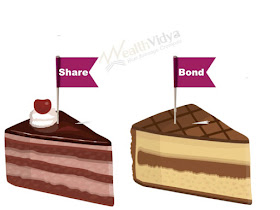Share is a piece of ownership of a business. Bond is a piece
of the loan of a business. Both are small pieces of a bigger cake, only the
cakes are different.
Share
Share is the single unit of a large sum (share capital)
invested by owners in the company. There are two types of shares, equity shares or common stock and preference shares or preferred stock. Equity or common shares being the most popular and widely owned we will concern ourselves with equity shares in this discussion.
As an investment, shares of excellent companies will yield excellent benefits of dividends and capital appreciation, over long periods of time and will generate enduring wealth.
As an investment, share alone can offer a shield against inflation.
Bond
Bond is
a type of loan that is broken down into small pieces and issued to general
public. Usually these are listed on popular stock exchanges are freely tradable
in the open market. As in the case of any loan, following terms of agreement are
pre-specified:
- Face value of the bond
- The rate of interest or coupon rate
- Frequency of payment of interest – quarterly or half yearly or annually
- Date of redemption or repayment or maturity
As an investment bonds yield a regular income. They are suitable for individuals and institutions who have a large corpus upfront and need a regular income for sustenance. They are not good for regular, middle class wage earners who have to build a corpus. Bonds do not offer any protection against inflation.
Differences between Share and a Bond:
Nature of Relationship
|
Owner
|
Lender
|
Return on Investment
|
Dividend
|
Interest
|
Mandatory Nature of income
|
Discretionary. Payable only upon declaration by directors.
|
Compulsory. No discretion in the hands of Directors.
|
Priority in Receipt of Income
|
Dividend can be paid only after interest is paid.
|
Interest is top most priority.
|
Capital Appreciation
|
Available
|
Not Always Available
|
Voting Rights
|
Available
|
Not Available
|
Priority in repayment during liquidation
|
Last, after all the obligations are met
|
After government and secured dues but before payment of
capital.
|
Scope of Participation Surplus Assets after all
obligations are met
|
Available
|
Not Available
|
Risk
|
Maximum Risk
|
Normal Risk
|
Rewards
|
Maximum Rewards
|
Limited Rewards
|
Liquidity of Investment
|
Liquid
|
Liquid only when listed on stock exchange.
|
To conclude, share is a piece of ownership of a business and bond is a piece of loan raised by the business. As an investment both serve different purposes. Shares offer inflation protection.




No comments:
Post a Comment